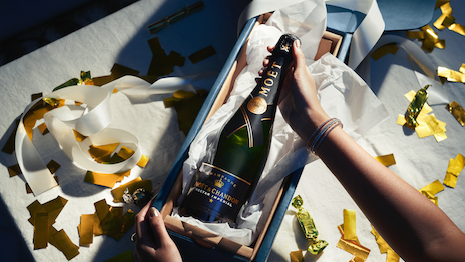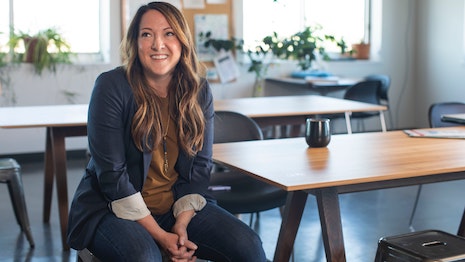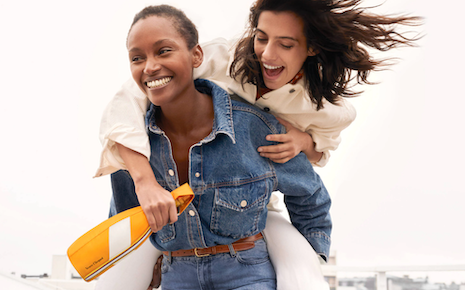 Wine and spirits remains a male-dominated industry. Image courtesy of Moët Hennessy
Wine and spirits remains a male-dominated industry. Image courtesy of Moët Hennessy Women continue recognizing that there remains a great deal of work to be done in terms of female representation in certain workforces, including the beverage sector.
According to a new study from Deloitte and inclusivity organization Women of the Vine and Spirits, only 10 percent of female respondents have seen significant positive change toward women in the last five years across the beverage alcohol industry. Women also believe that sectors like the beverage alcohol industry rank lower than travel and hospitality and tech at attracting women to the workforce.
“We know that it will be over 100 years until we achieve gender equity in the workplace," said Deborah Brenner, founder/CEO of Women of the Vine & Spirits, in a statement. "Until now, companies have relied on very limited data since most studies have included the beverage alcohol sector as part of a broader food and beverage industry categorization.
“This baseline report on DEI in [the] beverage alcohol [industry] will help inform leaders, allies and the next generation on how to effectively fasten the pace towards equity, creating more inclusive workplaces and increasing your company's bottom line.”
Deloitte and Women of the Vine and Spirits conducted two parallel surveys of beverage alcohol industry leaders on challenges and successful strategies regarding diversity, equality and inclusion goals.
Raising the bar
Experts and employees believe all sectors can do more to maintain more diverse workforces where women and underrepresented groups are supported.
When asked to what extent they have seen positive changes in the beverage alcohol industry’s attitude towards women in the last five years, 22 percent of respondents said it was about the same while 52 percent of respondents said there was only “some” positive change.
Two percent believe it has actually gotten worse.
 DEI efforts can build a sense of job security. Image credit: LinkedIn Sales Solutions/Unsplash
DEI efforts can build a sense of job security. Image credit: LinkedIn Sales Solutions/Unsplash
Less than 20 percent of women think their company’s efforts on DEI have been very successful in creating a better workplace, while 17 percent believe their company’s efforts were not very successful.
Nearly one in four respondents consider the travel and hospitality industry to successfully attract and retain a diverse workforce, while 20 percent said hi-tech and 15 percent said nonprofit. Only two percent elected the beverage alcohol industry.
When asked about the top issues keeping people from pursuing a career in the beverage alcohol industry, 60 percent of respondents cited a lack of diversity, equity and inclusion, followed by a lack of work-life balance, 45 percent, and a lack of exposure to career opportunities, 40 percent.
Eighty-one percent of women believe that minorities are underrepresented among their company’s senior executives. Eighty-one percent of respondents also said that the top factor that contributes most to a lack of diversity in leadership positions is an industry bias toward men for these positions.
In considering the future, respondents identified what certain companies were doing well and the numerous benefits of more inclusive workforces.
 Empowering women is at the heart of LVMH-owned Veuve Clicquot, as Madame Clicquot assumed the head of the company in 1805. Image credit: Veuve Clicquot
Empowering women is at the heart of LVMH-owned Veuve Clicquot, as Madame Clicquot assumed the head of the company in 1805. Image credit: Veuve Clicquot
For respondents who identified their companies’ efforts on DEI as good/excellent, 62 percent said their employers create a sense of job security, 57 percent said they promote diversity, equity and inclusion and 49 percent said they create a positive work/life balance for employees.
When considering the benefits associated with a diverse leadership team, 91 percent of respondents identified diverse perspectives in decision-making, 85 percent said enhanced creativity and innovation and 65 percent said balanced organizational management.
Women leading
For employees and leaders within the beverage alcohol industry and beyond, seeing women in leadership positions is vital.
Seventy percent of respondents believe that the visibility of key leaders who serve as role models and mentorship/sponsorship programs help develop a diverse workforce.
Inclusion is a necessity in luxury as several brands are actively working on attracting more women to their workforces and recognizing exceptional female leadership.
Last May, LVMH-owned Champagne brand Veuve Clicquot announced three women honored by its 2021 Bold Woman and Bold Future Award.
An international program recognizing the innovative and courageous contributions of female entrepreneurs, the Veuve Clicquot Bold Woman Award aims to recognize women who have distinguished themselves in building, taking on or developing a business. Women across industry sectors including technology, wellness, social services and law led the list of finalists for the awards (see story).
Brands are also working on identifying issues that prevent progress.
Later that year, Veuve Clicquot identified challenges facing women entrepreneurs in a survey, despite a growing desire for opportunities and leadership.
Veuve Clicquot presented the results of its second international survey of female entrepreneurship at the Les Rencontres Audacieuses” event at the “Cité Audacieuse,” known as a city space in Paris specifically dedicated to women’s rights. The research is part of “Bold by Veuve Clicquot” and surveyed respondents from 17 different countries (see story).